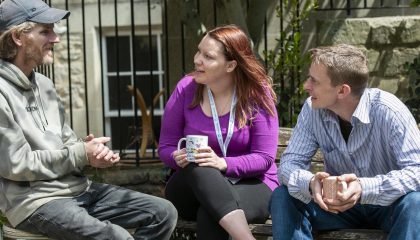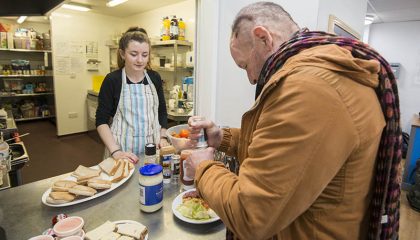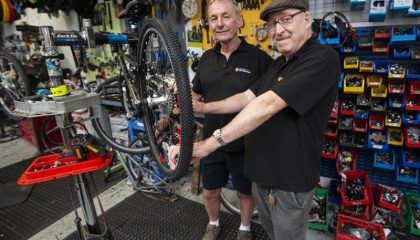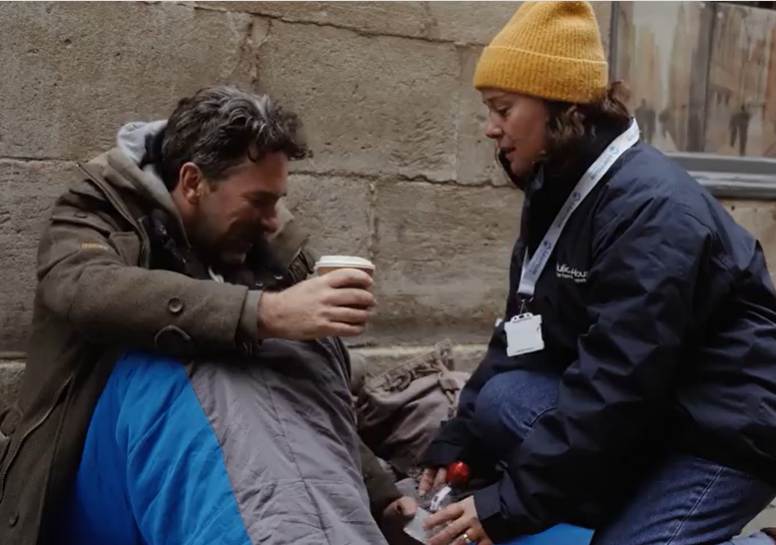Our Refugee Resettlement Service helps to enable the resettlement of those who have been identified by the United Nations as being the most vulnerable people fleeing persecution, violence, and life-threatening challenges in their countries of origin. Funded by the Home Office via B&NES Council, our team works mostly with families, many of whom have significant medical conditions and/or who have survived torture. The project supports and empowers families to rebuild their lives, move forwards from trauma, and live happily and independently in the UK.
We interviewed the team to find out a bit more about how the service works and what challenges the clients face:
Talk us through how you support a family – from when you first welcome them to the UK to when they leave your service.
We provide a staggered service-intensive support in the first year then progressively less involvement as we approach the end of the five years, which families will spend in the Vulnerable Persons Settlement Scheme. Our role is to prepare families for an independent and integrated life in the UK. Britain is an ordered society with established processes for many activities and support mechanisms, so it is important that they are prepared and confident in being able to navigate this.
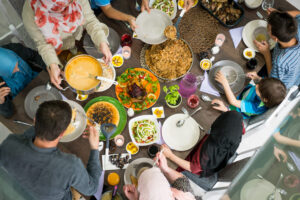 We start off by working in collaboration with Bath Welcomes Refugees. We prepare a home for the families arrival – furnished and decorated. One of the team from Julian House meets the family at the airport and settles them into their new home. Other families within the scheme will have made meals for the first day or so, to also welcome the new family. We will have already organised essential sign-up appointments (GP/dentist/landlord/school admissions/DWP etc) so will be supporting the family through this process. Volunteers are on hand to show them around Bath, local shops, how to use the buses, where Julian House is etc. They will also have a programme of English classes to attend. It is very busy with lots of appointments for them to manage and can it be quite a culture shock.
We start off by working in collaboration with Bath Welcomes Refugees. We prepare a home for the families arrival – furnished and decorated. One of the team from Julian House meets the family at the airport and settles them into their new home. Other families within the scheme will have made meals for the first day or so, to also welcome the new family. We will have already organised essential sign-up appointments (GP/dentist/landlord/school admissions/DWP etc) so will be supporting the family through this process. Volunteers are on hand to show them around Bath, local shops, how to use the buses, where Julian House is etc. They will also have a programme of English classes to attend. It is very busy with lots of appointments for them to manage and can it be quite a culture shock.
In the first few weeks, we will run a cultural orientation session to help families adjust and understand life in Britain. We then have regular key work sessions to support their progress towards independence and integration – exploring career or study ambitions, hobbies and interests. Initially, we will use interpreters for every contact but start to reduce this as their English language skills develop. All this has been particularly challenging during lockdown but we have maintained contact and continued to support families to engage with other services or agencies. Now we are moving out of lockdown we also run weekly drop-in sessions for clients to call in (by appointment) with letters or appointments that they need our support with. As time progresses we reduce key work sessions and drop-in’s becomes more relevant. By year 4 we are preparing a family for Step Down (which includes applying for indefinite leave to remain) and the end of Julian House support. By this time, they are usually confidently managing their lives with minimal involvement from us.
Why is the resettlement service so important?
It gives families who have already been through significant traumatic experiences (including war, violence and bereavement) a constructive and supported start to a new life in the UK.

Many successful lives have been interrupted by circumstances beyond their control: businesses closed, degrees unfinished, professional careers postponed. They bring fresh knowledge and experience to the UK. But re-settling is a challenging process, and the scheme has been developed to ensure that it is as positive an experience as possible and to aid independence and integration into a new life in the UK. It is also potentially life-saving for those who have been included in the scheme due to life-threatening illness – which would have been untreatable had they remained where they were.
What are some of the key challenges your clients face?
 There are so many! Imagine packing up what you can carry of your belongings and leaving family behind – it is very likely they will never see parents and other relatives again. They are leaving their community identities behind to start again with a new language, within a new culture and in a very different climate (the rain in the west country has been a bit of a surprise to some of our families!). There is also often a lot of loss to process for these families. Until they are able to work, families will be living on benefits which is a financial struggle.
There are so many! Imagine packing up what you can carry of your belongings and leaving family behind – it is very likely they will never see parents and other relatives again. They are leaving their community identities behind to start again with a new language, within a new culture and in a very different climate (the rain in the west country has been a bit of a surprise to some of our families!). There is also often a lot of loss to process for these families. Until they are able to work, families will be living on benefits which is a financial struggle.
Many services do not understand the need for interpretation or translated materials and we are constantly reminding them of this to ensure equality of access. Familiar foods they are confidant cooking with, are not available here either (although everyone has spotted the new International Store which opened recently!) so families often travel to Bristol for essential items.
There might be injury, illness and trauma to manage and there is also very possibly a loss of status. Someone with a successful and respected career is now a refugee – this isn’t always viewed with compassion and understanding by the wider populace. Very sadly racism has also been an issue – both overt and implied. All this aside, I am constantly humbled by their resilience and strength in circumstances I am not sure I would be able to manage as well or with as much dignity. I have gained and learned so much by working with them.

